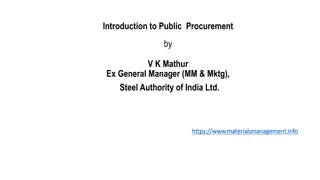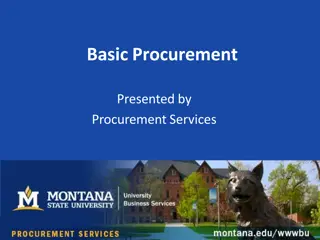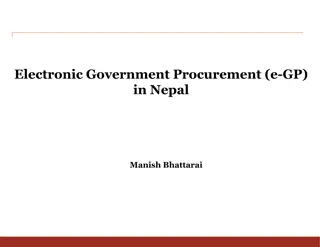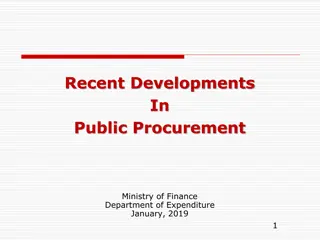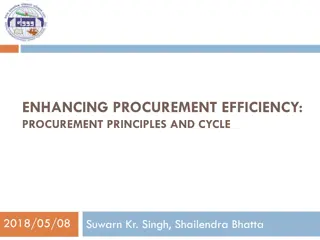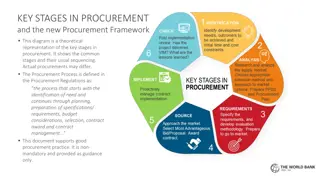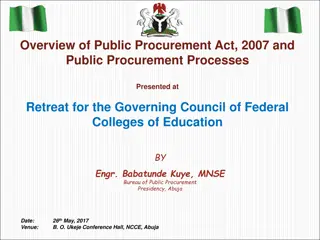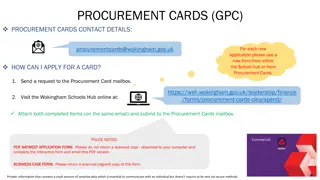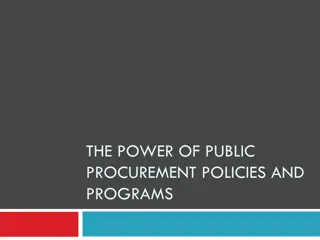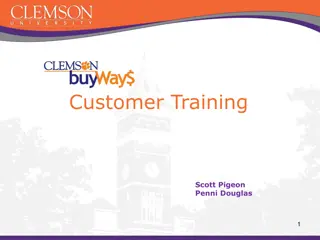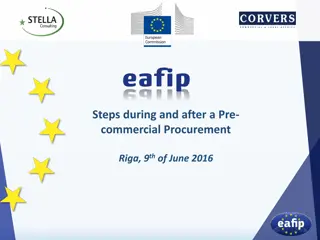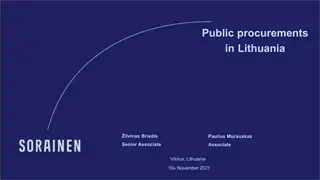Financial Responsibility and Procurement Training Overview
This overview covers key aspects of financial responsibility, procurement training, and fiscal roles within a university setting. It emphasizes protecting university resources, ensuring compliance with laws and regulations, and upholding ethical standards. It discusses the responsibilities and roles of officers, fiscal principals, managers, and approvers in guiding subordinates, monitoring controls, and ensuring transparency. The content underscores the importance of training staff, reviewing reports, and maintaining fiscal integrity in managing university finances.
Download Presentation

Please find below an Image/Link to download the presentation.
The content on the website is provided AS IS for your information and personal use only. It may not be sold, licensed, or shared on other websites without obtaining consent from the author.If you encounter any issues during the download, it is possible that the publisher has removed the file from their server.
You are allowed to download the files provided on this website for personal or commercial use, subject to the condition that they are used lawfully. All files are the property of their respective owners.
The content on the website is provided AS IS for your information and personal use only. It may not be sold, licensed, or shared on other websites without obtaining consent from the author.
E N D
Presentation Transcript
Fiscal Responsibility & Fiscal Responsibility & Procurement Training Procurement Training Financial Services Finance Compliance Unit Student Affairs Training 9.21.18
Fiscal Responsibilities Fiscal Responsibilities Protect University resources Official University business Compliant with Laws & Regulations Policies & Procedures Sponsorship/Grant award terms Uphold public appearance (newspaper test) Fiscal Code of Ethics Fiscal Certification Student Affairs Training 9.21.18
Fiscal Roles Fiscal Roles President Chancellor, Vice Chancellors, Associate Vice Chancellors, & Deans Officers Reviewer/Approver Chairs, Directors & Principal Investigators Fiscal Principals Reconcilier Fiscal Managers Department Administration Managerial and Non-Managerial, Fiscal and Non-Fiscal Fiscal Staff Student Affairs Training 9.21.18
Officers & Fiscal Principals Officers & Fiscal Principals Guide subordinates Ethical & transparent (tone & culture) Aligned with University objectives Review reports Budget Monitor internal controls Monitor delegated authority Train staff Student Affairs Training 9.21.18
Fiscal Managers Fiscal Managers Guide subordinates Ethical & transparent (tone & culture) Knowledgeable of fiscal policies & procedures Train staff Review reports key compensating control Ensure appropriate expenditures & allocation Investigate irregularities Correct errors Review Marketplace & Procurement Card purchases Monitor internal controls Gatekeeper! Expected to have sufficient knowledge to ensure compliance with University policies and procedures and identify the indicators of fraud Student Affairs Training 9.21.18
Approvers Approvers Has authority to deny and question. Does it comply with University or Grant policy & procedures? How will this appear to the public? Does this make sense? Is it adequately supported? Be skeptical and ask questions to validate If it doesn t feel right, question it! Ask Provost Office or Compliance Unit for assistance. Is it within available resources? Student Affairs Training 9.21.18
Goals of Financial Reconciliation Goals of Financial Reconciliation 1. Ensure all transactions are documented and appropriate for the SpeedType and Account Code, taking into consideration available resources. 2. Provide management with reasonable assurance that resources are safeguarded and transactions are authorized, valid, complete, and accurate. 3. Identify and correct errors in a timely manner. Don t wait until June! (Ideally, review reports monthly. However, review each speedtype at least quarterly, on a rotation.) 4. Demonstrate good stewardship and accountability. Student Affairs Training 9.21.18
Financial Report Reconciliation Financial Report Reconciliation Start with Trial Balance or Operating Summary/Balance Sheet. Review monthly totals to validate they agree with your understanding of the budget/activities for the month. Run Financial Detail, including balance sheet accounts Verify correct speedtypes were charged Verify correct account codes used Ensure you clear account codes 013109 Company Card Personal Charges and 553201 Company Card Unallowable Expenses Agree/Match transactions to supporting documentation Document/process correcting transactions Review Outstanding Encumbrance report for accuracy to ensure future expenses will be charged appropriately (payroll/purchasing) Verify all errors from prior month have been corrected Provide update to management, as appropriate, on any outstanding issues/questions Student Affairs Training 9.21.18
Financial Report Reconciliation (cont.) Financial Report Reconciliation (cont.) How to interpret Concur and Marketplace transactions on Fin Detail Report Marketplace transactions on financial reports Concur transactions on financial reports Red Flags to consider: Inadequate/Missing/Altered documentation Copied, not original documents Unusual purchasing patterns Unknown vendors Payments just under University thresholds Inadequate/No separation of duties one person doing all parts of the transaction Lack of required approval Changes in key staff Odd or unexplained transactions Student Affairs Training 9.21.18
Procurement Procurement Student Affairs Training 9.21.18
Procurement Code of Ethics Procurement Code of Ethics Avoid the intent and appearance of unethical or compromising practice in relationships, actions, and communications; Demonstrate loyalty to the University by diligently following all lawful instructions while using professional judgment, reasonable care, and exercising only the authority granted; Conduct all purchasing activities in accordance with the laws, while remaining alert to and advising the University regarding the legal ramifications of the purchasing decisions; Refrain from any private or professional activity that would create a conflict between personal interests and the interests of the University Identify and strive to eliminate participation of any individual in operational situations where a conflict of interest may be involved; Never solicit or accept money, loans, credits, or prejudicial discounts, and avoid the acceptance of gifts, entertainment, favors, or services from present or potential suppliers which might influence or appear to influence purchasing decisions; Promote positive supplier relationships through impartiality in all phases of the purchasing cycle; Display the highest ideals of honor and integrity in all public and personal relationships in order to merit the respect and inspire the confidence of the public being served; Provide an environment where all business concerns, large or small, majority- or minority-owned, are afforded an equal opportunity to compete for University of Colorado business; and, Enhance the proficiency and stature of the purchasing profession by adhering to the highest standards of ethical behavior.
Sensitive Expenses Sensitive Expenses Sensitive expenses must meet the Tests of Propriety. Sensitive Expenses include but are not limited to: Beverage service Consumables for personal consumption Flowers - allowed for official functions Donor Cultivation and Fundraising Donations & Sponsorships Food Alcohol Official functions Entertainment activities Refer to https://www.cu.edu/psc/policies/psc-procedural-statement- sensitive-expenses for full policy details. Student Affairs Training 9.21.18
Alcohol Purchases Alcohol Purchases Alcohol Committee: Legal Security Risk Financial Approval Process: Reserve location for event Decide invitation method and guest list Reserve caterer or other food service Ensure allowable funding is in place Complete Alcohol Authorization Form (Finance Office website) Route to department Officer for approval (Dean) Submit to UCD.Controller@ucdenver.edu Student Affairs Training 9.21.18
Alcohol Alcohol Unallowable Unallowable NO alcohol service during work hours NO progressive drinking events NO serve-yourself with students present bar needs to be attended, preferably a TIPS certified bartender NO student-recruitment events NO alcohol is permitted in the Nighthorse Campbell Building Student Affairs Training 9.21.18
Official Functions Official Functions An Official Function is a meeting, meal, or other function that is hosted by an organizational unit, attended by guests and/or other associates or employees, and held for official university business. Occasional events; not recurring like Staff meetings or lab meetings daily rounds for faculty and residents Training functions Enhance staff knowledge Written agenda Study materials Retirement functions Recruitment functions Lectures by visiting guest speakers Employee recognition events (annual) Refer to website for form. https://www.cu.edu/psc/forms /official-function Student Affairs Training 9.21.18
Sponsorships/Donations Sponsorships/Donations A sponsorship/donations can be classified as A contribution or charitable gift to another organization Purchase of tickets to an external community relations function University fundraising events Proper Approvals: Department (Dean or Officer) Controller Provost/Senior Vice Chancellor for Administration and Finance Routing: Send all requests to Compliance Unit @ FS-Compliance@ucdenver.edu once you have obtained Dean approval. Student Affairs Training 9.21.18
Sponsorship/Donations (cont.) Sponsorship/Donations (cont.) Include the following information: Name of Organization you are donating/sponsoring: Organization s EIN #: Per IRS Guidelines, is this organization a public charity, non-profit, 501(c)(3), etc.? Name of Event: Amount: Please describe the type of event (luncheon, conference, etc.): What is the mission of the donee/sponsored organization? How does the mission describe above relate to the University s mission? What benefit will be gained by contributing university funds to this organization? Evidence of Dean or another officer approval. Refer to APS #4027 for policy details: https://www.cu.edu/ope/aps/4027 Student Affairs Training 9.21.18
Petty Cash/Change Funds Petty Cash/Change Funds Petty Cash and Change Fund programs MUST be preapproved by Deputy Controller Three Jobs: Handling money Cash in/out Custody, Receipting Billing & Booking Reconciling books to source (e.g. receipts, protocol, lab records, subsystem, bank account) Split among at least 2 DIFFERENT people Compensating controls MUST be built if not possible Securing cash and checks Dual controls on cash! Endorsement stamp on check Locked safe / file cabinet in locked room Physical security All items must have receipts or log Look for receipt/log irregularities Appropriateness, number, alterations, initials Creation of Payment Authorization form to replenish petty cash Check payable to guardian of funds Periodic scheduled AND surprise counts Student Affairs Training 9.21.18
Gift Cards Gift Cards Prohibited Uses: Student Academic Awards (Financial Aid Office) Payments to non-resident aliens (IRS Withholding) Permitted Uses: Study Subject Compensation Survey Incentives Recognition Honoraria The purchase of gift cards must be preapproved by the Deputy Controller. The Compliance Unit is here to help ensure your setup will satisfy needed accountability. Contact the Compliance Unit at 303-315-2255 or PCGC@ucdenver.edu Resource: Refer to Gift Card policy https://www.cu.edu/psc/psc-procedural-statement-gift-cards for full details. Student Affairs Training 9.21.18
Contracts Contracts General rule is Do Not Sign Contracts. Banquet orders (BEOs) or tax affidavits can be signed as long as there are no terms & conditions or other clauses that commit the university. Don t Forget! If hiring an event coordinator, same controls apply. All approvals and invoices go through the same channels. This is to avoid circumventing the policies, controls and putting the University at risk. Terms in venue contracts that should be reviewed by PSC: Arbitration Attorney s Fees Choice of Law where a state other than Colorado is listed or International Law Exclusive Purchase Agreements Indemnification Insurance Requirements Additional Insured Limitation of Liability Student Affairs Training 9.21.18
Contract Signature Authority Contract Signature Authority Expenditure contracts of any dollar amount require Procurement Service Center approval. PSC Purchasing Agents are the only individuals authorized to sign expenditure contracts for goods and services on behalf of the University. Small-dollar Contracts For contracts of $10,000 and less: Before proceeding with the purchase, send the contract or agreement to the PSC. Email or fax the contract to the appropriate Purchasing Agent. Include the supplier s contact information (name, email address, phone number). The PSC will review the contract for legal sufficiency, obtain all necessary signatures, and email the completed contract to you. Send the contract to the supplier. (If you re ordering through the CU Marketplace, attach the completed contract to the non-catalog form as an external attachment.) Keep a copy of the signed agreement; the PSC does not keep copies of contracts that are $10,000 and less. Online Contracts ( Clickthrough Agreements) For contracts of $10,000 and less: You may agree to the terms and conditions of small-dollar online agreements as long as a signature is not required. Large-dollar Contracts For contracts over $10,000: Work with the PSC on both the contract and the purchase. Create a requisition in the CU Marketplace using the appropriate form. Attach a WORD version of the contract or agreement. The PSC will review the contract for legal sufficiency and obtain all necessary signatures. The PSC Purchasing Agent will send the completed contract to the supplier when the purchase order is issued. IMPORTANT! For contracts of any dollar amount, you should always carefully read and understand all terms and conditions. Pay particular attention to requirements that relate to the business deal, renewal terms, pricing, and termination. Student Affairs Training 9.21.18
Commodity Listing Commodity Listing PSC has a posted list of common commodities, procurement options, procedures for purchasing and price agreements that are in place. Refer to http://www.cu.edu/psc/commodity-listing University Price Agreements are listed once you click on the type of commodity you want to purchase. Top Items include: Computers DELL Furniture CCi Office Supplies Staples State Price Agreements are also listed. Cell Phones/PDAs AT&T, Sprint, Verizon and T-Mobile options Student Affairs Training 9.21.18
Procurement Card (P Procurement Card (P- -card) card) General Rules & Guidelines: Marketplace is the preferred method of procurement for all purchases. Use your P-Card only when the purchase is small-dollar and Marketplace is not a viable option. As a cardholder, you are responsible for knowing and following University and any department-specific fiscal and procurement rules. All purchases should be reconciled within 30 days of the transaction date. (However, if you have questions on the transactions do not approve until questions resolved.) Absolutely NO taxes should be charged to your card. Individual contractor and service providers cannot be paid on a P-Card. Student Affairs Training 9.21.18
Appropriate Use of P Appropriate Use of P- -Card Card All purchases must meet the following expectations for appropriate use: The purchase is appropriate for the University and has a valid business purpose. The purchase cannot be made through Marketplace and is allowable on the P- Card. The purchase follows the guidelines of sponsored projects and/or program fee purpose (if using a Program Fee SpeedType). Student Affairs Training 9.21.18
Appropriate Use of P Appropriate Use of P- -Card (cont.) Card (cont.) Purchases that are specifically prohibited on the Procurement Card: Split purchases Dividing up a payment to the same vendor that s over your one-time purchase limit, where the total cost of the purchase is known at the time of payment. Any furniture Travel and travel-related expenses Tax on purchases Payments to individual suppliers and service providers Purchases of goods or services where a contract is required Student Affairs Training 9.21.18
Violations Violations If you violate procurement card policy, you will receive 50 violation points by the PSC. If you reach 150 points, your card will be suspended for six months or revoked. Failure to reconcile reports on time, provide thorough documentation, or use the P-Card responsibly can result in revocation at any time per the discretion of the Department. Accidental personal purchases: Notify your AO immediately. Make every effort to have the supplier refund the card and have you pay personally instead. If you cannot get a refund, you must reimburse the University and attach the validated cash receipt to your expense report. Student Affairs Training 9.21.18
Monthly P Monthly P- -card Cycle card Cycle Step 1: Before Purchase Step 2: Cardholder Makes a Purchase Step 3: Cardholder Reconciles Expenses Step 4: Submit Report Obtain approval for purchase Determine if purchase is appropriate on P- Card Obtain required documentation (receipt) Expense uploaded to Concur AO reviews report Your report will be sent back as many times as it takes to get it right, so please take the time to do it correctly the first time Create one expense report per month Add approvals and info to report Attach receipts Note: The Audit Trail feature in Concur tracks all actions and shows if an AO views a receipt before approving. Internal Audit looks at this audit trail during their reviews. Select AOs carefully to ensure they can devote the proper amount of time to perform detailed reviews and that they know the policies. Student Affairs Training 9.21.18
Increase to Procurement Card Limit Increase to Procurement Card Limit Effective July 1, 2017, the department small dollar threshold increased from $5,000 to $10,000. HOWEVER The Denver and Anschutz Medical Campuses have decided to maintain the $5,000 small dollar purchase limit on procurement and travel cards. Very rare exceptions will be considered by the Controller. Student Affairs Training 9.21.18
CU Marketplace: PO vs. SPO CU Marketplace: PO vs. SPO Purchase Order: Created and approved in the CU Marketplace by the campus department prior to an order being placed. Used it for non-catalog purchases up to $10,000, and for catalog purchases up to $25,000. Standing Purchase Order: Online request in the Marketplace used for repetitive purchases or for services provided by a non-catalog supplier over a specific period of time (e.g., personal services contracts) of more than $10,000. SPO requisition initiates action by the purchasing agent. Issuance of a Purchase Order by the purchasing agent is your authorization to order directly from the supplier, during the specified time period and within the specified dollar limits. Student Affairs Training 9.21.18
After After- -the the- -Fact Purchase Fact Purchase An ATF purchase typically occurs when an organizational unit makes a large-dollar purchase (more than $10,000) from a single supplier before the PSC issues a purchase order (PO). For example, if you submit a requisition for over $10,000 in supplier services and then you authorize the supplier to begin work before the PSC issues the PO that s an ATF! It doesn t matter if your requisition is for goods or services. It doesn t matter if your requisition is for one item over $10,000 or for multiple items totaling over $10,000. It doesn t matter if the cost without shipping is $10,000 or less. After-the-Fact purchases result in delayed payments to suppliers who have, in good faith, provided goods or services to the University. They undermine the strong working relationships that CU strives to create and sustain with its supplier partners & raise concerns that the department s processes are not adequate. If you create an ATF, you must follow the steps outlined in the PSC Procedural Statement After-the- Fact Purchases (https://www.cu.edu/psc/procedures/after-fact-purchases). Be sure to discuss with the designated campus contacts: Barbara Hayes (4-2276) or Caroline Kirkwood (5-2286) Student Affairs Training 9.21.18
Before you buy, consider Before you buy, consider Is there a University Price Agreement? If so, consult the How-to-Buy on the PSC website and use the CU Marketplace for your purchase. Is the good or service available in the CU Marketplace? Think Marketplace First. Is the purchase allowable? As a best practice, see the APS Propriety of Expenses and PPS Sensitive Expenses. How much does the good/service cost? The small dollar purchasing threshold is $10,000. POs over this amount will require Financial and Sponsored Projects (for F30/31) approval. If the good/service is not available in CU Marketplace and it is under $5,000, is it allowable on the Procurement Card? See Procurement Card Handbook for prohibited transactions. Personal reimbursement of goods is limited to $5,000 and is further limited to commodities not covered by university price agreements unless prompted by critical business need. Student Affairs Training 9.21.18
Holiday Functions Reminder Holiday Functions Reminder Holiday functions are allowed for potluck types of events. In general, university funds should not be used to fund parties during the holiday season. If the holiday function meets the criteria of an Official function or includes Alcohol, be sure to follow approval procedures as set forth in the related PSC procedural statements. No general funds (610xxxxx series) or auxiliary funds (620xxxxx, 629xxxx series) may be used to cover any portion of the holiday function. Holiday gifts/cards for faculty, staff and or students are not allowed to be paid from any speedtype. Holiday gifts include but are not limited to: Gifts (e.g. cash, gift cards, non-cash items) Flowers, fruit baskets, candy, etc. for expressing holiday wishes, get-well, or congratulation wishes Holiday cards (Note - holiday cards may be sent for community relations support but requires prior approval from the appropriate officer). Student Affairs Training 9.21.18
Contact Information Contact Information Caroline Kirkwood, Compliance Manager 303-315-2286 or caroline.kirkwood@ucdenver.edu Compliance Unit Email (Alcohol, Donations, Sponsorships, General Inquiries) FS-Compliance@ucdenver.edu Petty Cash/Change Funds/Gift Cards Email pcgc@ucdenver.edu Student Affairs Training 9.21.18
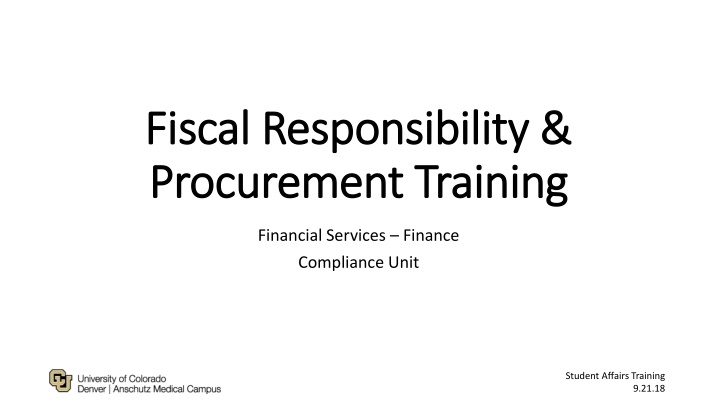




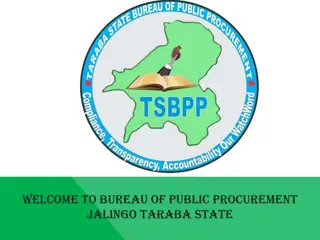
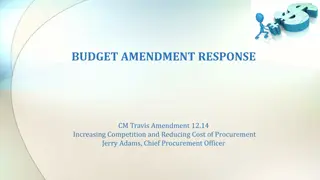
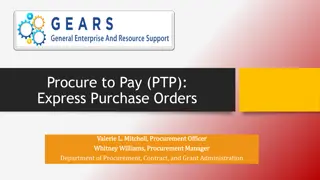
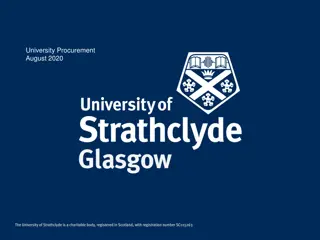
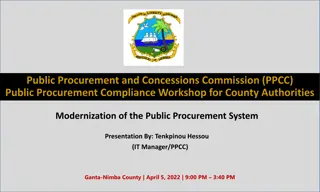
![Comprehensive Overview of Corruption Watch Submission on Public Procurement Bill [B18B-2023]](/thumb/138344/comprehensive-overview-of-corruption-watch-submission-on-public-procurement-bill-b18b-2023.jpg)
